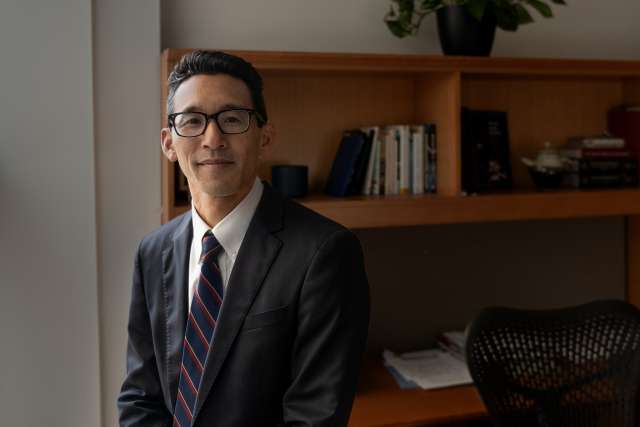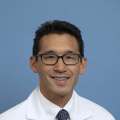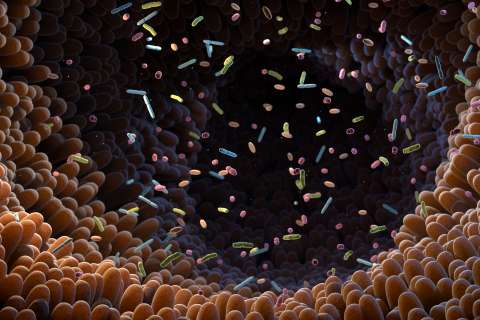Long before he was named chief medical officer in June 2022, Erick Cheung, MD, has been helping to shape care provided at Stewart and Lynda Resnick Neuropsychiatric Hospital (RNPH) at UCLA.
After completing his residency at the hospital in 2011, Dr. Cheung oversaw UCLA’s emergency psychiatric services, served as associate and interim medical director and was chief quality officer for RNPH. Dr. Cheung, an associate professor of health sciences, still treats patients up to eight hours per week and serves as a hospitalist attending physician four weeks per year.
We recently discussed his career path, the hospital’s priorities, the mental health crisis and UCLA Health’s plans for a replacement psychiatric hospital with expanded access to care.
This conversation has been edited for brevity and clarity.
Did you always think you would become a doctor? A psychiatrist?
It was not always the plan. There were little seeds along the way, general ideas I could be good at it. I went to UCSD (University of California, San Diego) as a biology major but I quickly wandered off to explore a communications major, then a few months later dipped a toe into sociology, before finally settling down as a psychology major.
Later, I became very interested in the connection between psychology and neuroscience – essentially curious about how basic molecules in our body can give rise to something so complex as human consciousness. That happened while studying abroad in Paris and I was taking a course on surrealistic poetry. Surrealistic poetry, it turns out, has a lot of similarity to psychoanalysis and the study of the mind, where exploring the unconscious mind is essential. I learned that freeing one’s thoughts to occur in their most natural states leads to creativity in poetry; in psychoanalysis, it can lead to insight and opportunity for change. So that was the first time I thought I could have a career in medicine, with the level of intellectual interest I had about how the mind works.
(Dr. Cheung has bachelor’s degrees in cognitive psychology and neuroscience and a minor in French literature from UCSD and a doctorate in medicine from Albany Medical College with an emphasis in medical ethics. He is board-certified in psychiatry and neurology.)
Since becoming chief medical officer, what have been your biggest priorities?
Besides myself, we have a relatively new Resnick leadership team, and we’ve been working hard to align our collective priorities, essentially what we’re trying to achieve over the next five years. The four key areas are: data-driven world-class care, operational transparency and communication, recruitment and retention, and financial transparency and accountability.
We think of UCLA Resnick Neuropsychiatric Hospital as one of the truly premier places where you can receive psychiatric care. We’re building clinical and operational programs rooted in quality improvement and methodology that includes developing robust data to demonstrate the excellent outcomes for our patients.
What sort of outcomes are you tracking and how? What will that look like in the future?
It is a high priority for us to be able to quantify and qualify outcomes in a meaningful way in areas such as patient experience and satisfaction, hospital re-admission rates, successful connections to follow up care after hospitalization, equitable access to care, reduction in illness burden, and helping a person to recover to their maximal functional ability.
Measuring a person’s functional ability or capacity over time is among the most challenging in the field of mental health. That’s the future, and what we’re moving toward at UCLA Resnick Neuropsychiatric Hospital.
Measurement-based care isn’t exactly new for mental health, but it’s also not widely adopted, especially in inpatient hospital settings. Having rating scales or objective data points that tell you the state of the person’s illness – whether it’s depression, bipolar or psychotic symptoms – and being able to see objective data points across time is ideal. It won’t answer everything, but it’s going to give us some sense of whether we are impacting people’s diseases or conditions in a positive way.
We’re in the midst of a mental health crisis – nationwide, across California and here in the Los Angeles area. What do you see as Resnick’s role in addressing this?
There are a couple of major ways we aim to impact that issue. Locally, it’s expanding our services, and UCLA Health has committed to this in a big way by planning for a new and expanded psychiatric hospital in the Mid-Wilshire area of Los Angeles. This means 60% more inpatient beds, increasing from our current 74 to 119. Beyond that, we have designed a state-of-the-art crisis stabilization unit; there are relatively few in this country. This will allow us to receive patients from all avenues – walk-ins, 9-1-1 responses – and help keep patients with mental health emergencies out of the medical emergency department if they don’t need to be there. It’s really in keeping with the concept of the right services, in the right place, at the right time. (The new hospital is on a path to open in 2026.)
Additionally, through the support of our Resnick Neuropsychiatric Hospital Board of Advisors, we have added psychiatric services to UCLA Health’s Homeless Healthcare Collaborative to address the critical mental health needs for patients who are experiencing homelessness.
How does the research that’s being conducted at UCLA transform into better care at Resnick?
UCLA is extraordinarily prolific in academic research focused on behavioral health and brain science, and much of the care we provide is based on the latest research conducted here and elsewhere.
For example, one area where UCLA has a wealth of knowledge and expertise is around autism, which is a pretty complicated illness. Most psychiatric hospitals don’t take patients with this diagnosis because they don’t think they have the capacity or capability to handle them. We believe it is our mission to care for these patients.
The reasons why individuals with autism arrive in an acute psychiatric hospital most frequently have to do with behavioral aggression. We start with careful clinical evaluation and assessment to be sure we understand the complete diagnostic picture, and commonly there are co-existing conditions such as depression or bipolar disorder, anxiety, obsessive compulsive disorder, attention deficit disorder. Many of these conditions will be helped by medications, but it is also the unfortunate reality that the medications will only go so far to address some of the dominant issues, especially when it comes to aggression. This is where UCLA research has demonstrated the value of incorporating behavior analysts in the care team. A few years ago, we invested in a board-certified behavioral analyst to complement our traditional approaches (medication and therapy) to address the critical elements around behavior and learning.
One of our key priorities and areas of innovation is to apply this comprehensive approach –medications, therapy, rehabilitation, and now behavioral analysis and treatment – to help reduce aggressive behavior and importantly to avoid interventions like having to seclude or restrain a person who is acting violently. With this approach we have already seen significant reductions in these types of interventions.
What programs do you think distinguishes Resnick from other psychiatric hospitals?
Patients who come to us are seen by among the best clinicians – psychiatrists, social workers, rehabilitation specialists, nurses and many others – available anywhere. We are often the hospital that people seek out when they have severe conditions that have not improved despite treatment at other locations.
We also have eight partial hospital programs that operate in the outpatient arena, and these are truly gems. They are high-demand programs because of the caliber of the clinicians and staff working there, and because of their specialized treatment areas. For instance, we have a perinatal program for expecting mothers or recent mothers suffering mental health issues, and we have an adult and child obsessive compulsive disorder program for really intractable OCD.
From my perspective, it’s relatively easy to stand up a generic partial hospital program in a community, but it’s hard to do the highly specialized intensive treatment that we do here. These are truly amazing programs here that help people discharge from the hospital with comprehensive follow-up services that truly restore their function.
What do you like to do outside of work?
If I am not at work, you’ll probably find me at my local surf break at Topanga State Beach. If not there, I might be at the tennis courts, ski slopes or off in the woods camping with my family. I started surfing in San Diego about 25 years ago and get out to the waves as much as I can. During the pandemic I did some experimenting with building surfboards out of reclaimed wood and lumber, which surprisingly worked out pretty well. I feel incredibly fortunate to live in a city where you can put in a hard day of work and then wash away the stress by just paddling out into the Pacific.




